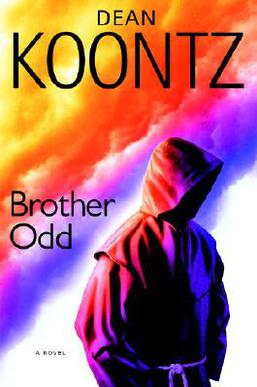 Brother Odd by Dean Koontz is the third novel in the Odd Thomas series. I have read the first two novels in the series as well; I think there are seven in total. The first novel was jarring and it was darker, in many aspects, than I liked. The second novel was really quite bizarre and wild. I feel like for this third novel, Koontz dialed-back the totally crazy and pared down the setting quite a bit. In a way, it is almost the opposite of the pandemonium in the second novel, Forever Odd.
Brother Odd by Dean Koontz is the third novel in the Odd Thomas series. I have read the first two novels in the series as well; I think there are seven in total. The first novel was jarring and it was darker, in many aspects, than I liked. The second novel was really quite bizarre and wild. I feel like for this third novel, Koontz dialed-back the totally crazy and pared down the setting quite a bit. In a way, it is almost the opposite of the pandemonium in the second novel, Forever Odd.
I am not going to lie – I utterly enjoyed this novel. I want to give it five stars, but if I do, I am honestly “afraid” that people will think that I have gone soft or that such a rating will discredit my ratings generally. The thing is, I said I enjoyed this novel, not that this novel is a great work of high literary worth. I could be bashful and not give it the rating I want to give it, but that does not suit. So, if readers of this blog think that I have lost my mind because of it, well, so be it.
Some of the reasons why I think this is a five-star novel include the setting. I really enjoy suspense novels that have “locked down” settings. The characters being stranded, trapped, isolated always seems to make a tightly-wound thriller. Not every such story is guaranteed to be a success. Often it happens that such stories start becoming repetitive or treading water, so to speak. However, I like the resourcefulness and courage that it makes the characters have (or not have, as the case may be) to stuff them into one location. Sometimes being stranded becomes boring – authors get stranded right along side those characters. They have to keep our interest with a lot more limited space. As a reader, I tend to enjoy seeing what authors can do with tight settings.
After the previous two novels, I think that the more subtle and reduced approach with the storytelling in this novel worked well. I was apprehensive that since the second novel had been so off-the-rails, this third would have to be completely outrageous. So, it was really good that Koontz pulled his foot off of the gas. In this novel, Odd Thomas is at a monastery in Sierra California. St. Bartholomew’s Abbey also has a school of sorts, which is really a home for severely disabled and unwanted children. The school is run by nuns. Odd Thomas breaks open the story sharing that he has been a guest in their guesthouse for about seven months.
Straightaway, the reader’s suspicions are built among the cast of characters – and obviously, it is a sense of something-or-other because in this location, these people have an added curtain of morals to their existence. Yes, the story taking place in a monastery gave me a little pause at first – I admit I was expecting Koontz to make a mocking and a very, let us say, agenda-ized story. Truthfully, I cannot say that he did not – but it is 180° from what I was worrying about.
There is more faith in this story than in 90% of the things I have read in the last decade. Yeah, color me surprised.
Oh, the novel is also 30% suspense and 70% sentimentality.
I am not one that usually enjoys any emotional content in my novels. Usually, the emotional content in novels is so poorly-written it makes me grumpy. Somehow, for whatever reasons, this novel did not make me grumpy. When I say emotional, in this novel that usually means misery and pain. There is so much misery and pain that the characters in this novel seem to have around them – but the terrible, terrible, awful terrible part is that I know all the other parts of the novel are fiction. The pain parts…. the miseries and sufferings of the characters? Those parts are not fiction. Humans can be a rotten lot. Oh, I do not mean the specifics, naturally. Do not act like you do not know what I am talking about. Anyway, my heart was sort of broken for some of the miserable characters in the book – but no, not them. I was unhappy because I know these characters represent real world situations/people. That bothers me.
Chapter 45 is particularly gut-wrenching in all respects. All respects. Its a multi-faceted viewpoint wherein the scenes depicted just swirl the emotional content every which way. And this includes the reveal of the true status of a specific shady character – yeah, the Russian character, of course. Its a scene, where time is of the essence, but the characters have to communicate information and backstory. Imagine standing in a hallway with a nun, Odd Thomas, and a big Russian dude – and they are talking about the horrific backstory to a poor child in nearby room. This chapter is a very heavy chapter. Mainly, I think, the point is to have the reveal about the Russian character and also show the fortitude and backstory relevance of Odd Thomas himself. It actually accomplishes a lot more than that.
This novel is not really anything other than a superficial, kind-of entertaining pulp fiction. I mean, you likely would not include it in your permanent collection and I do not think it is going to set Koontz up for any prized awards. The villain is kind of obvious and the pseudo-science is incredibly ridiculous. Is it very creative and horrific? Yes, I would say so. The horror is suspenseful, just like the incredible blizzard that arrives, wouldntchaknowit, right on time for the climax of the action!
I am telling you – its an eye-rolling story. It is a story so full of silly and goofy and ridiculous. Like the poltergeist who rings the bells or the dog, Boo, there are so many things that all the seasoned and skeptical readers will just be utterly disgusted by. All these silly comments by Odd all the time combined with the villain cut from a James Bond movie just make all the cool kid readers scoff and snort derision. The problem is: this is a story that you have to look at obliquely. Its true all the saccharine elements will make most readers feel like they ate too much candy and the whole story is just so contrived! These are true criticisms and I agree – but the contents that we have to look at obliquely are upsetting. I think most readers will rather focus on knocking around all the sentimentality rather than writhing in sorrow over the elements that do not go away after you close the book cover.
I know that there are a whole pile of readers out there that will not like this book whatsoever. They probably dislike it for a few differing reasons, as well. This book is really not for everyone. The author told me a good story that had elements in it that I could access and that also I could be entertained by. I know I cannot recommend this book to nearly anyone. That is okay, because even though I lamented above that there is all this crime and evil – I’m going to continue right along with my crime/noir reading like nothing ever happened. I think. Maigret is on deck. He is never cheery.
4.7 stars (bring it.)
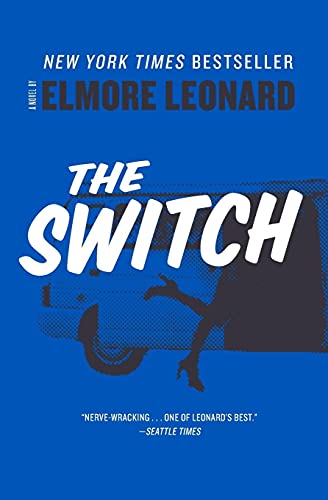 The Switch by Elmore Leonard (1925 – 2013) is the first of two books about crooks Ordell Robbie and Louis Gara. I think most readers are more familiar with 1992’s Rum Punch. The Switch is a snappy, quick, crime novel that is a decent introduction, I suspect, to Leonard’s novel writing. It was first published in 1978. Leonard is known for his wry wit, his snappy dialogue, and his trimmed plotlines. Every reader has at least heard about his famous “Ten Rules of Writing,” which is an essay delineating what Leonard thinks good novelists should adhere to in order to make their novels readable. Allegedly, Leonard sticks to these rules himself, though his essay was only published in 2007.
The Switch by Elmore Leonard (1925 – 2013) is the first of two books about crooks Ordell Robbie and Louis Gara. I think most readers are more familiar with 1992’s Rum Punch. The Switch is a snappy, quick, crime novel that is a decent introduction, I suspect, to Leonard’s novel writing. It was first published in 1978. Leonard is known for his wry wit, his snappy dialogue, and his trimmed plotlines. Every reader has at least heard about his famous “Ten Rules of Writing,” which is an essay delineating what Leonard thinks good novelists should adhere to in order to make their novels readable. Allegedly, Leonard sticks to these rules himself, though his essay was only published in 2007. I have this side-project of reading crime novels and I finished The Bat and nothing good to report about it. Maybe a decade ago, I feel the bookstores were all wild about the “new Norwegian thriller author” Jo Nesbø. The edition of The Bat that I read has “First Vintage Crime Edition July 2013” on the copyright page. It had been sitting around on bookshelves for a long time. It was definitely time to read it up and move it out.
I have this side-project of reading crime novels and I finished The Bat and nothing good to report about it. Maybe a decade ago, I feel the bookstores were all wild about the “new Norwegian thriller author” Jo Nesbø. The edition of The Bat that I read has “First Vintage Crime Edition July 2013” on the copyright page. It had been sitting around on bookshelves for a long time. It was definitely time to read it up and move it out.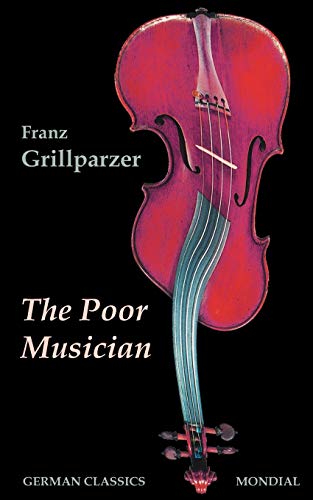 I mentioned recently that I am working in 19th C. German thought lately, and one of the peripheral items that I read was The Poor Musician by Franz Grillparzer (1791 – 1872). This little novella is Der arme Spielmann and maybe I prefer the translation The Poor Minstrel better. It was first published in 1848.
I mentioned recently that I am working in 19th C. German thought lately, and one of the peripheral items that I read was The Poor Musician by Franz Grillparzer (1791 – 1872). This little novella is Der arme Spielmann and maybe I prefer the translation The Poor Minstrel better. It was first published in 1848.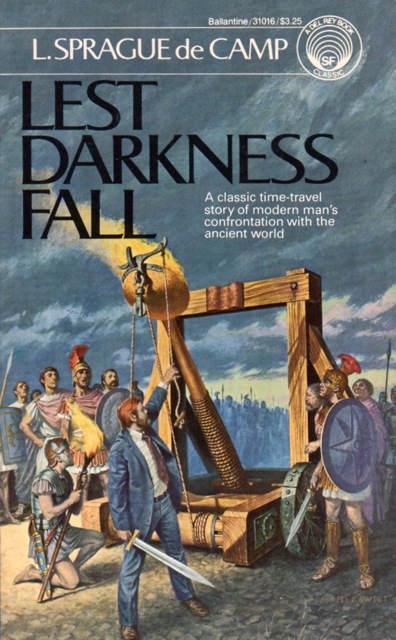 Now that I have remembered this blog, I have another review to post. I recently finished Lest Darkness Fall by L. Sprague de Camp (1907 – 2000). I read the Ballantine/ Del Rey 1983 edition with cover art by Darrell K. Sweet. I think the story was first published in periodical format in 1939, but the final novel format was released in 1941. I think it is an essential read for vintage science fiction readers. Generally, it is a story of time-travel and alternative history.
Now that I have remembered this blog, I have another review to post. I recently finished Lest Darkness Fall by L. Sprague de Camp (1907 – 2000). I read the Ballantine/ Del Rey 1983 edition with cover art by Darrell K. Sweet. I think the story was first published in periodical format in 1939, but the final novel format was released in 1941. I think it is an essential read for vintage science fiction readers. Generally, it is a story of time-travel and alternative history.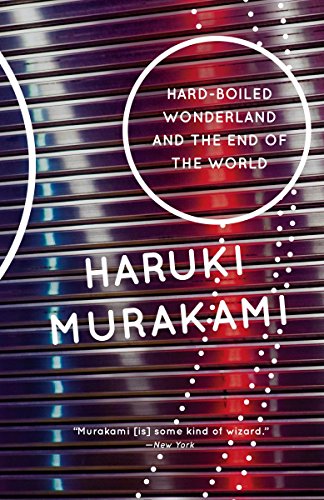 Hard-Boiled Wonderland and the End of the World by Haruki Murakami was first published in 1985 in Japan and the English translation was released in 1991. This is the third Murakami I have read and the best of the three. After I had read halfway through this novel, I had more or less decided that I was giving it at least four stars. I really wanted to be able to push it up to five stars, but there are some elements of the novel that I just do not care for.
Hard-Boiled Wonderland and the End of the World by Haruki Murakami was first published in 1985 in Japan and the English translation was released in 1991. This is the third Murakami I have read and the best of the three. After I had read halfway through this novel, I had more or less decided that I was giving it at least four stars. I really wanted to be able to push it up to five stars, but there are some elements of the novel that I just do not care for. It seems that I have just been reading Aira lately – but if you glance at the dates of the blog entries, its been weeks and weeks. An Episode in the Life of a Landscape Painter is actually the very first Aira I owned. It took me no less than three attempts to get started and get through this little (its 88 pages) novella. Instead, after two attempts, I just read other Aira’s!
It seems that I have just been reading Aira lately – but if you glance at the dates of the blog entries, its been weeks and weeks. An Episode in the Life of a Landscape Painter is actually the very first Aira I owned. It took me no less than three attempts to get started and get through this little (its 88 pages) novella. Instead, after two attempts, I just read other Aira’s! Mistborn was published in 2006. This is the first in Brandon Sanderson’s Mistborn series, which is set in the world Scadrial. It is the second Sanderson novel that I have read. This review is one that I have procrastinated writing for several months. Unfortunately, due to my procrastination, some of the more detailed commentary I might have been inclined to write about has passed from my memory. However, some of the reason for my procrastination is exactly because I did not care to get into the details with this novel.
Mistborn was published in 2006. This is the first in Brandon Sanderson’s Mistborn series, which is set in the world Scadrial. It is the second Sanderson novel that I have read. This review is one that I have procrastinated writing for several months. Unfortunately, due to my procrastination, some of the more detailed commentary I might have been inclined to write about has passed from my memory. However, some of the reason for my procrastination is exactly because I did not care to get into the details with this novel. I had “just” finished a César Aira (b. 1949) novel in late January, but here I am having read another. I finished The Literary Conference last night. I cannot help it; I find these strange little novels utterly enticing and, I guess, addictive. They are unique and fill this odd niche sort of space. I have no idea regarding the dates of publishing for this book. According to the front matter of the book in front of me, the novella was originally published in 2006 as El congreso de literatura. I am not going to lie – on Wikipedia [the Source of Truth and Wisdom] this is listed as being published in 1997. It does feel like an earlier work by Aira (I say as if I am an Aira-expert). My edition is the New Directions paperback with cover art by Rodrigo Corral, translated by Katherine Silver.
I had “just” finished a César Aira (b. 1949) novel in late January, but here I am having read another. I finished The Literary Conference last night. I cannot help it; I find these strange little novels utterly enticing and, I guess, addictive. They are unique and fill this odd niche sort of space. I have no idea regarding the dates of publishing for this book. According to the front matter of the book in front of me, the novella was originally published in 2006 as El congreso de literatura. I am not going to lie – on Wikipedia [the Source of Truth and Wisdom] this is listed as being published in 1997. It does feel like an earlier work by Aira (I say as if I am an Aira-expert). My edition is the New Directions paperback with cover art by Rodrigo Corral, translated by Katherine Silver. Roadmarks by Roger Zelazny (1937 – 1995) was first published in 1979. I had heard it can be a difficult read due to its structure and style. I would agree with that, but that sort of stuff works out at least midway through the novel. The problem is that, at best, I can describe this novel as “interesting” when there is so much about it that should have developed into awesome and tremendous.
Roadmarks by Roger Zelazny (1937 – 1995) was first published in 1979. I had heard it can be a difficult read due to its structure and style. I would agree with that, but that sort of stuff works out at least midway through the novel. The problem is that, at best, I can describe this novel as “interesting” when there is so much about it that should have developed into awesome and tremendous.